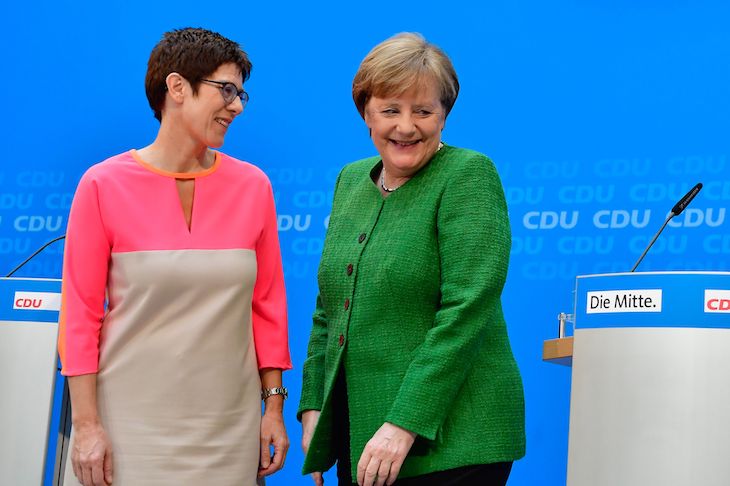On Monday, Angela Merkel did something quite extraordinary. As speculation about her party’s leadership mounted, she named an apparent successor: thae 55-year-old Annegret Kramp-Karrenbauer, appointed as the new general secretary of her Christian Democratic Union party. The choice came like a lightning strike: AKK, as she is already called, was to leave her job as a successful minister-president of the tiny federal state of Saarland and assume the governing position in her party. Now she sits as the CDU’s crown princess, looking to take the throne at (or even before) the next German election in 2021.
So Merkel has answered critics who considered her unwilling or unable to refresh her senior team. ‘The Chancellor without an alternative’ she used to be called — a phrase that looked rather complacent after the cataclysmic election where Merkel seemed to have single-handedly made Alternative für Deutschland into a force in German politics.
Elevating AKK was most unlike Merkel. In her 12 years at the helm, she has cunningly nipped one potential rival after another in the bud. Helmut Kohl did the same in his 16 years as chancellor. To name a successor — or even build up a potential heir — was alien to both Merkel and Kohl’s thinking. Their definition of succession management was to see off any likely successor.
But Germany is now impatient with Merkel’s indistinct style — so into the breach jumps the cool and unpretentious AKK, who didn’t wait to be called upon but offered herself as the candidate for the recently vacant post of general secretary. A job Merkel herself held under Kohl — a fact she seemed to have forgotten when she erroneously introduced Kramp-Karrenbauer by proclaiming that ‘in her, the CDU has the first woman general secretary in its history’. The resulting mirth about this slip cast a smile over Ms Merkel’s face, the first time she’d stopped scowling in months.
So all eyes are now on AKK, the abbreviation of the future. But she won’t solve the unanswered question of who is to govern Germany during the next parliamentary cycle. Whither Merkel if the SPD members reject the grand coalition? In a sense it would be salutary for Germany if a coalition other than the ‘grand’ could be found, as it would avoid democratic obesity, as it were, where the two parties in the middle provide for ‘more of the same’, at the expense of a fresh start.
The preferred option for Merkel, AKK and the rest is coalition with the Greens. If the SPD’s share of the vote, as evinced in the latest opinion polls, continues to decline — it is already near or at the level of the AfD — the Conservatives and the Greens might combine to come up with a sufficient majority over all other parties. In Germany, nobody likes the idea of a minority government solution — or another election, come to think about it. Stay tuned.
All this should be borne in mind by any Brits who are hoping for a strong German hand to descend over Brussels at the last minute and sort out a decent trade deal. Ms Merkel has enough of her own woes — and even if she didn’t, no one in Berlin seems to have any idea what Theresa May wants in future EU relations. No details were forthcoming in the Prime Minister’s appearance at the Munich security conference this week. Before he became Brexit secretary, David Davis said that the real trade negotiation will take place ‘in Berlin, to strike a deal’. He’d be unlikely to say that now. The simple truth is that Germany cannot even begin to think about Brexit. Sorting out its own political uncertainty is the first order of business.






Comments